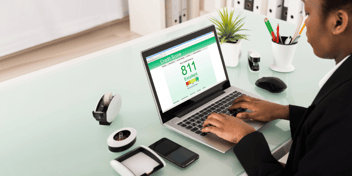How to Create a Monthly Budget That You'll Stick to
February 27, 2024
.png)
It's no secret that a budget is the key to eliminating financial stress and reaching your financial goals. So why do so many of us fall short?
If you're anything like us, your intentions probably start off well every month. You know that to get a handle on your finances, you need to create a budget, but by the time the end of the month rolls around, it's clear that your spending has gone off track. Let's look deeper at why that happens, and how to fix it.
Why Bother With a Budget?
Budgeting is a must when it comes to gaining control of your personal finances. It helps you gain control over your money and ensures that you have a clear understanding of your income, expenses, and savings goals. This awareness lets you make informed decisions about your finances and helps you prioritize your spending. Without this knowledge, it's easy to find yourself in a cycle of overspending and maybe even digging yourself into an ever-deepening hole of debt.
Take Inventory of Your Finances
Before you can begin building your budget, you need to assess your current financial situation. It's not uncommon for people to forget to include a bill or expense when creating a budget, that's why it's important to look at your income and expenses for more than the current month. Ideally, you will go back and look at six months of financial transactions - income and expenses - but if that seems overwhelming even 60-90 days of history will work. This snapshot of your finances will give you a good picture of your income, expenses, debts, and assets so you can create a budget based on real numbers.
Track Your Spending
Tracking your spending is a crucial part of sticking to your budget and one that many of us fall short on. The reality is that tracking spending was simpler in a world before debit and credit cards. While checkbooks are a thing of the past for most people, it was easier to track expenses because it was usually paid for by check and documented accordingly in the check register.
In today's world of digital payments, it's easy to lose track of how much you spend. Especially since it's not always with a debit or credit card - it may be through Venmo, Pay Pal, or Cash App. This is why it's important to utilize an online tool or app that has the ability to categorize expenditures directly into user-defined categories. Education First members have access to iThrive, a free online budgeting tool that's easily accessible via online banking or mobile app.
Tracking your spending is critical because it helps you to make informed decisions about your finances. It allows you to identify any unnecessary expenses and make adjustments as needed. By being mindful of your spending, you can ensure that you are sticking to your budget and working towards your financial goals.
Build in Flexibility
While it is important to stick to your budget, it is also crucial to build flexibility. Unexpected expenses or changes in your financial situation may arise, and having some room for adjustments can help you navigate these situations. Many budgets fail because they don't account for unexpected costs such as car repairs, medical emergencies, or home maintenance. Without a buffer for these expenses, people may dip into savings or use credit cards, leading to financial strain.
One way to build this flexibility is by creating a separate category in your budget for unexpected expenses. An Emergency Fund is usually a separate account (we recommend one without a debit connected to it) where you can squirrel funds away for, well, emergencies. And before you ask, "I don't feel like cooking dinner tonight." does not qualify as an emergency. This fund is for expenses that do not recur every month, and that you didn't budget for otherwise. Wondering how long it will take to build your Emergency Fund? You can use this free Rainy Day Calculator to simulate how long it will take to reach your Emergency Savings Fund goal.
Rinse and Repeat.
It is important to review and update your budget regularly. As your financial situation changes or your goals evolve, your budget may need to be adjusted. In a perfect world you'll review your budget monthly to make sure everything is on track, but let's face it, the world isn't perfect. That's why we recommend that you do this practice quarterly, or sooner if you find yourself running out of funds and turning to credit to pay ordinary expenses.
A few things you'll want to keep an eye out for are actual spending vs. budgeted spending, changes in income or expenses, and progress towards financial goals, like paying off debt or building an emergency fund, By building in flexibility, you can ensure that your budget remains realistic and achievable. It allows you to adapt to unexpected circumstances without derailing your financial progress.
Ready to get started building your budget? Download our Budget Planning Guide now.


.png?width=352&name=Debt%20Consolidation%20(1).png)

